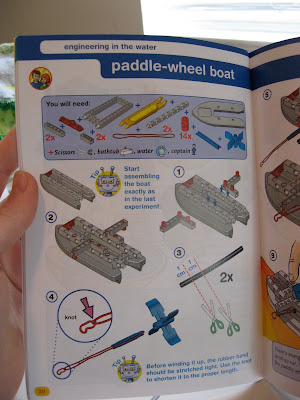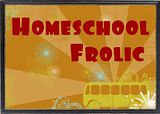 I am not a scientist. Far from. I am not even interested in science. I don't really care why electricity works or what composes the earth's crust, or even that the earth has a crust.
I am not a scientist. Far from. I am not even interested in science. I don't really care why electricity works or what composes the earth's crust, or even that the earth has a crust.But I also think it is lame when homeschoolers teach their children everything they love, and avoid those things they don't love. I try very hard to avoid doing that and while I haven't brought myself to touch dinosaurs with a ten-foot pole, I have integrated quite a bit of science into our homeschool.
This engineering kit has been most helpful in doing so.
 If you type in Little Labs: Intro to Engineering, you can find it for sale on numerous websites. Here's a link to amazon, but I'm pretty sure I found mine cheaper from a homeschooling store.
If you type in Little Labs: Intro to Engineering, you can find it for sale on numerous websites. Here's a link to amazon, but I'm pretty sure I found mine cheaper from a homeschooling store.Here's my pros and cons.
Pros: I wouldn't have taught simple machines without help. This is the help I needed. Cons: Anyone with any lick of creativity in this area could have come up with their own experiments. In fact, the books from the library that we've used were loaded with easy experiments.
Pros: Everything was in one place and I didn't have to figure out what I needed for any other experiments.
Pros: My children have LOVED it.
Cons: It is a large box that has very few things in it but a lot of packaging.
So, good for me and my family since I need help in the science area, but probably not for a family with a science-oriented (or braver) primary teacher.
 Here's the "guidebook." It has lots of illustrations to explain how things go together. And like I said, there aren't a lot of parts involved. I still had Timothy explain to me how to do the first few. I just needed a little reassuring.
Here's the "guidebook." It has lots of illustrations to explain how things go together. And like I said, there aren't a lot of parts involved. I still had Timothy explain to me how to do the first few. I just needed a little reassuring.



 Here's the stuff in the box. I know--I was disappointed when I first opened it. $25 for a few plastic parts and some punch-out paper??!! But, we've enjoyed the unit immensely and all the activities are perfect for my children's ages and abilities. After using the product, I am no longer disappointed. It was just what I needed to ease myself into a science unit.
Here's the stuff in the box. I know--I was disappointed when I first opened it. $25 for a few plastic parts and some punch-out paper??!! But, we've enjoyed the unit immensely and all the activities are perfect for my children's ages and abilities. After using the product, I am no longer disappointed. It was just what I needed to ease myself into a science unit.




No comments:
Post a Comment